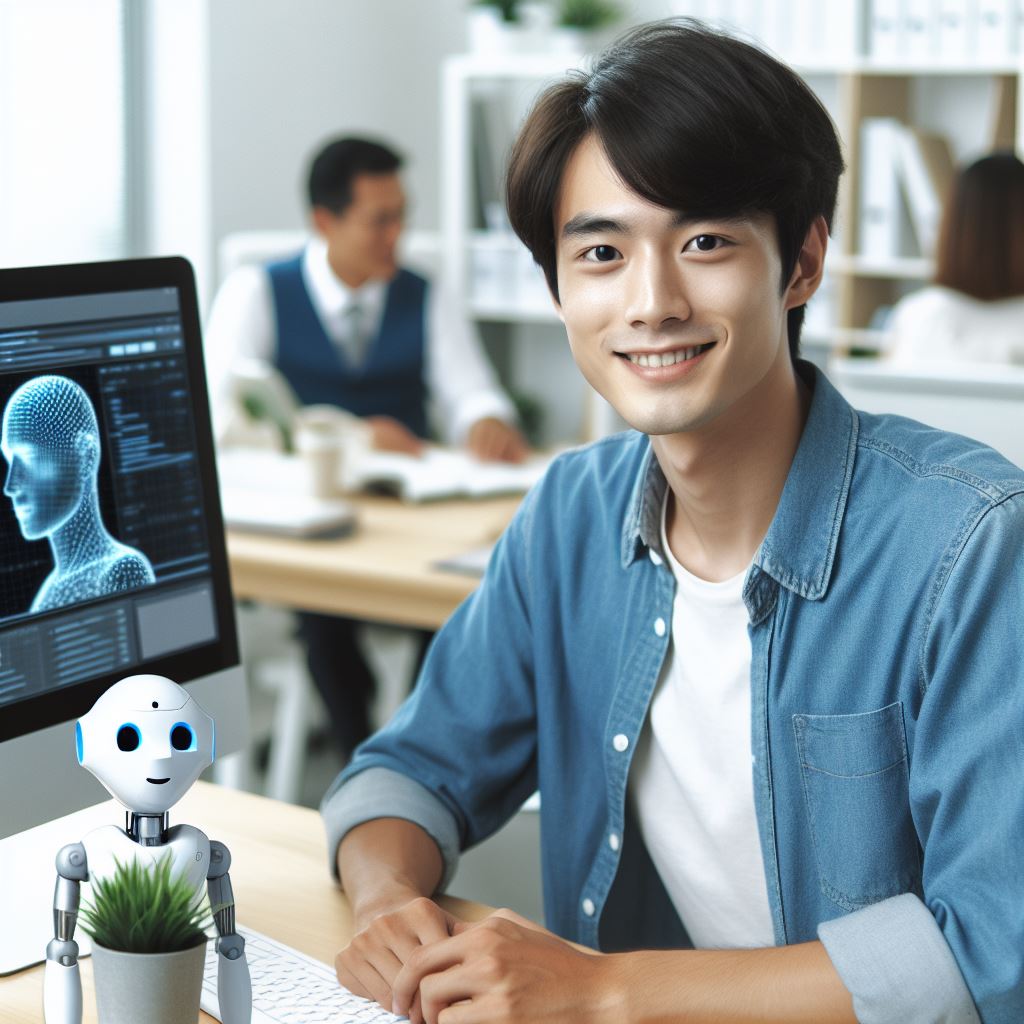Introduction
Automation and artificial intelligence (AI) have revolutionized industries around the world.
Workers are increasingly worried about the future of their jobs in this rapidly changing landscape.
AI-proof professions offer a sense of security and stability amidst automation fears.
As technology continues to advance, it is crucial to explore career paths that are resistant to automation.
This blog post will outline some safe and in-demand careers that are less likely to be automated.
Understanding AI and Its Capabilities
What artificial intelligence is and how it operates
Artificial Intelligence (AI) represents a paradigm shift in computing, emulating human intelligence to process vast amounts of data.
Unlike traditional software, AI systems can adapt and learn from data without explicit programming.
By utilizing techniques such as machine learning and deep learning, AI algorithms can recognize patterns, make predictions, and even autonomously adjust their behavior based on new information.
These systems are capable of performing complex tasks that were once exclusive to human intelligence, such as natural language processing, image recognition, and decision-making.
Essentially, AI operates by analyzing data, identifying patterns, and using those patterns to make predictions or decisions, much like the human brain.
Examples of professions and tasks that have already been significantly impacted by AI and automation
AI and automation have significantly impacted various professions and tasks across multiple industries.
For instance, in the realm of data entry and processing, AI algorithms can swiftly and accurately handle vast amounts of information, reducing the need for manual labor.
Similarly, customer service has been transformed by chatbots and virtual assistants, streamlining communication and enhancing efficiency.
Furthermore, manufacturing processes have become increasingly automated, with robots taking on repetitive tasks previously performed by humans.
These examples illustrate how AI has revolutionized traditional workflows, leading to increased productivity and cost savings for businesses.
Limitations of AI and why certain professions are less likely to be automated
Despite its advancements, AI still faces limitations that make certain professions less susceptible to automation.
While AI excels at tasks that involve data analysis and pattern recognition, it struggles with tasks requiring creativity, empathy, and complex decision-making.
Professions such as artistry, therapy, and law rely heavily on human intuition, emotional intelligence, and moral reasoning, making them less likely to be automated in the foreseeable future.
Additionally, the ethical and social implications of fully automating certain professions raise concerns about job displacement and the potential dehumanization of essential services.
Thus, while AI continues to evolve and reshape various industries, there remain realms where human expertise and ingenuity remain indispensable.
Transform Your Career Today
Unlock a personalized career strategy that drives real results. Get tailored advice and a roadmap designed just for you.
Start NowRead: Child-Focused Professions: Careers with Kids
Characteristics of AI-Proof Professions
Key characteristics that make a profession resistant to automation
AI-proof professions possess unique characteristics that set them apart from roles that can easily be replaced by automation.
These key qualities make them invaluable in a world increasingly shaped by artificial intelligence and technology.
- Creativity: Professions that rely on creativity, such as artists, designers, and writers, are less susceptible to automation.
The human ability to innovate, imagine, and think outside the box is difficult to replicate with AI. - Emotional Intelligence: Jobs that involve understanding and managing emotions, such as therapists, social workers, and counselors, are highly resistant to automation.
Empathy and compassion are inherently human traits that machines cannot easily replicate. - Advanced Decision-Making: Roles that require complex decision-making based on multiple factors, such as doctors, lawyers, and senior executives, are less likely to be automated.
Human judgment, intuition, and experience play a crucial role in these professions.
Why professions requiring a high degree of human interaction and empathy are less likely to be automated
Professions that prioritize human interaction and empathy are less susceptible to automation because they involve nuanced emotions, empathy, and understanding that are challenging for AI to replicate.
Jobs that require authentic human connection and emotional intelligence are considered AI-proof, as they tap into the uniquely human qualities that machines cannot imitate.
Read: Fun Professions to Dress Up As for Events
Examples of AI-Proof Professions
Healthcare Sector
Physicians and nurses: In the healthcare sector, physicians and nurses play indispensable roles that technology cannot replicate.
They possess a unique blend of expertise, diagnostic skills, and compassionate care that is essential for treating patients.
Physicians rely on their extensive medical knowledge and experience to diagnose illnesses accurately and develop tailored treatment plans.
Nurses, on the other hand, provide crucial support by administering medications, monitoring patients’ conditions, and offering emotional support during challenging times.
Mental health professionals: Another vital aspect of the healthcare sector is mental health care, where AI falls short in comparison to human professionals.
Mental health professionals, such as psychologists and therapists, possess a deep understanding of human emotions and behavior.
They provide personalized therapy sessions, counseling, and interventions to help individuals navigate through their mental health challenges.
The human touch and empathy they offer are irreplaceable in fostering trust and facilitating healing processes.
Creative Professions
Artists, writers, and designers: Creativity is a uniquely human trait that cannot be replicated by artificial intelligence.
Artists use their imagination and technical skills to create visually stunning artworks that evoke emotions and provoke thoughts.
Writers craft compelling stories, articles, and poems that resonate with readers on a profound level.
Designers bring innovative ideas to life, whether in fashion, architecture, or graphic design.
These creative professionals constantly push boundaries, driving progress and innovation in their respective fields.
Technical and Highly Specialized Professions
Skilled tradespeople (electricians, plumbers): Technical and highly specialized professions require a blend of practical skills and problem-solving abilities that AI lacks.
Transform Your Career Today
Unlock a personalized career strategy that drives real results. Get tailored advice and a roadmap designed just for you.
Start NowElectricians and plumbers, for instance, must navigate complex systems and troubleshoot issues in real-time.
They rely on their manual dexterity and expertise to tackle unforeseen challenges, ensuring that essential services continue to function smoothly.
Despite advancements in automation, these hands-on professions remain in high demand due to their indispensable nature.
Legal professionals: Legal professionals operate in a realm governed by intricate laws, ethics, and human judgment.
While AI can assist in legal research and document analysis, it cannot replace the nuanced decision-making abilities of lawyers and judges.
Legal professionals interpret complex statutes, argue cases persuasively, and provide clients with personalized advice tailored to their unique circumstances.
Their role extends beyond mere application of rules; they serve as advocates for justice and guardians of the rule of law in society.
Read: Top Work-From-Home Professions in 2024

How to Prepare for a Career in an AI-Proof Profession
Strategies for pursuing education and training that emphasizes the skills less likely to be automated
When preparing for a career in an AI-proof profession, it is essential to focus on skills that are less likely to be automated.
This involves pursuing education and training that emphasize critical thinking, problem-solving, and creativity.
The importance of continuous learning and adaptability in keeping one’s skillset relevant and competitive
Continuous learning and adaptability are key factors in staying relevant and competitive in the job market.
With technology constantly evolving, it is important to keep up with the latest trends and developments in your field.
Seeking professions that blend technical knowledge with soft skills like creativity, emotional intelligence, and ethical judgment
Professions that blend technical knowledge with soft skills like emotional intelligence and ethical judgment are in high demand.
By developing a well-rounded skillset, you can position yourself for success in a rapidly changing work environment.
Advice on seeking these professions includes networking with industry professionals, attending relevant conferences and workshops, and seeking out mentors who can offer guidance and advice.
It is also crucial to stay informed about industry trends and developments to ensure you are always one step ahead.
By following these strategies and focusing on developing a diverse skillset, you can prepare for a successful career in an AI-proof profession.
Remember, the key to success lies in being adaptable, continuously learning, and staying ahead of the curve.
Read: Best Professions to Study for Future Success
The Future of AI-Proof Professions
How AI and automation might evolve and potentially impact professions currently considered AI-proof
The relentless march of technology prompts speculation on AI’s future impact.
Transform Your Career Today
Unlock a personalized career strategy that drives real results. Get tailored advice and a roadmap designed just for you.
Start NowProfessions traditionally deemed immune may face disruption.
Advancements in AI could blur the line between human and machine capabilities.
Industries relying on routine tasks may see significant automation.
Yet, nuanced roles demanding human creativity and emotional intelligence may endure.
Predicting AI’s trajectory underscores the need for adaptability and continuous learning.
The role of human workers in an increasingly automated world, focusing on collaboration with AI to enhance productivity rather than compete with it
In the era of automation, human workers remain indispensable.
Collaboration between humans and AI unlocks unparalleled productivity.
AI excels at repetitive tasks, while humans contribute intuition and empathy.
Together, they form a symbiotic relationship, amplifying each other’s strengths.
Rather than fearing displacement, humans should embrace AI as a productivity ally.
Harnessing AI’s potential requires a shift in mindset towards collaboration and synergy.
Encouragement for individuals to focus on developing a unique blend of skills that cannot be easily replicated by machines
As AI advances, individuals must cultivate irreplaceable skills.
A diverse skill set combining technical and human-centric abilities is invaluable.
Critical thinking, emotional intelligence, and adaptability defy automation.
Embracing continuous learning ensures relevance in a dynamic job market.
Investing in uniquely human qualities safeguards against obsolescence in an AI-driven world.
Strive for a skill set that not only withstands automation but thrives alongside it.
Conclusion
It’s imperative to recognize AI-proof professions in today’s job landscape, where automation looms large.
Creativity, empathy, and ethical discernment hold enduring significance amidst this technological tide.
As we conclude this discussion, let’s delve deeper into the significance of identifying and pursuing AI-resistant careers.
Transform Your Career Today
Unlock a personalized career strategy that drives real results. Get tailored advice and a roadmap designed just for you.
Start NowIn a world where automation threatens traditional job roles, individuals must be proactive in safeguarding their professional future.
Creativity, the ability to think outside the box and generate innovative solutions, remains a uniquely human trait that is difficult to replicate with AI.
Whether it’s designing captivating marketing campaigns or crafting compelling narratives, creative professionals have an edge in an increasingly automated world.
Empathy, the capacity to understand and connect with others on an emotional level, is another invaluable skill that AI lacks.
In fields such as counseling, healthcare, and customer service, human empathy plays a pivotal role in providing personalized support and care.
Ethical judgment is indispensable in navigating the complex moral dilemmas posed by advancing technologies.
From ensuring fairness in algorithmic decision-making to upholding privacy rights in data collection, ethical considerations demand human oversight and intervention.
In light of these reflections, it is incumbent upon individuals to assess their interests and skills through the lens of AI-proof criteria.
By proactively aligning their career paths with professions that leverage human creativity, empathy, and ethical judgment, individuals can future-proof their livelihoods in an increasingly automated world.
Let us heed the call to action to embrace the enduring importance of human qualities in the face of automation.
By cultivating our creativity, empathy, and ethical discernment, we can not only thrive in the age of AI but also contribute meaningfully to a more compassionate and ethically grounded society.
[E-Books for Sale]
The Big Book of 500 High-Paying Jobs in America: Unlock Your Earning Potential
$19.99 • 500 High-Paying Jobs • 330 pages
Explore 500 high-paying jobs in America and learn how to boost your career, earn more, and achieve success!
See All 500 High-Paying Jobs of this E-Book
1001 Professions Without a Degree: High-Paying American Jobs You Can Start Now
$19.99 • 1001 Professions Without a Degree • 174 pages
Discover 1001 high-paying jobs without a degree! Unlock career tips, skills, and success strategies for just $19.99!




